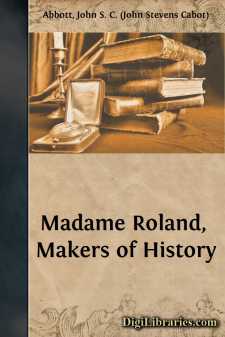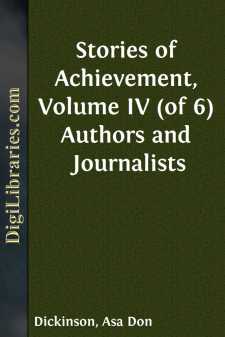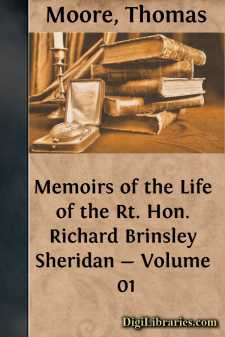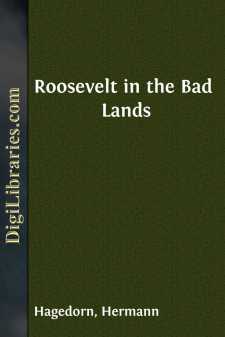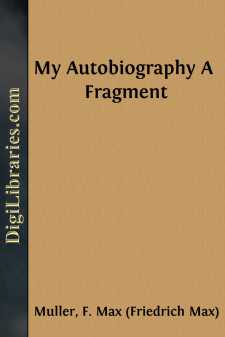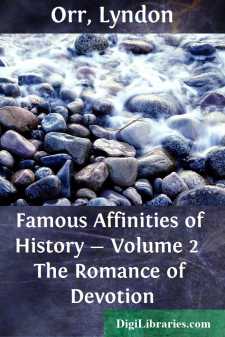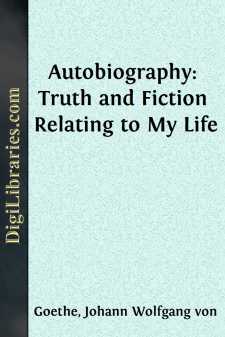Biography & Autobiography
- Adventurers & Explorers 15
- Artists, Architects, Photographers 16
- Business 2
- Composers & Musicians 14
- Criminals & Outlaws 5
- Editors, Journalists, Publishers 6
- Educators 1
- Entertainment & Performing Arts 3
- General
- Health, Exercise & Fitness 1
- Historians 3
- Historical 83
- Law Enforcement 1
- Lawyers & Judges 3
- Literary 147
- Medical 7
- Military 48
- Naturalists, Gardeners, Environmentalists 8
- Personal Memoirs & Diaries 226
- Philosophers 3
- Political 9
- Presidents & Heads of State 38
- Religious 38
- Rich & Famous 27
- Scientists 13
- Women 31
General Books
Sort by:
Childhood. 1754-1767Characters developed by the French Revolution.Madame Roland.Many characters of unusual grandeur were developed by the French Revolution. Among them all, there are few more illustrious, or more worthy of notice, than that of Madame Roland. The eventful story of her life contains much to inspire the mind with admiration and with enthusiasm, and to stimulate one to live worthily of...
more...
JEAN JACQUES ROUSSEAU THE MAN TO WHOM EXPRESSION WAS TRAVAIL From the "Confessions of Rousseau." It is strange to hear that those critics who spoke of Rousseau's "incomparable gift of expression," of his "easy, natural style," were ludicrously incorrect in their allusions. From his "Confessions" we learn that he had no gift of clear, fluent expression; that he was...
more...
by:
Thomas Moore
CHAPTER I. BIRTH AND EDUCATION OF MR. SHERIDAN.—HIS FIRST ATTEMPTS IN LITERATURE. Richard Brinsley [Footnote: He was christened also by the name of Butler, after the Earl of Lanesborough.] Sheridan was born in the month of September, 1751, at No. 12, Dorset Street, Dublin, and baptized in St. Mary's Church, as appears by the register of the parish, on the fourth of the following month. His...
more...
by:
Hermann Hagedorn
It was still the Wild West in those days, the Far West, the West of Owen Wister's stories and Frederic Remington's drawings, the West of the Indian and the buffalo-hunter, the soldier and the cowpuncher. That land of the West has gone now, "gone, gone with lost Atlantis," gone to the isle of ghosts and of strange dead memories. It was a land of vast silent spaces, of lonely rivers,...
more...
PREFACE For some years past my father had, in the intervals of more serious work, occupied his leisure moments in jotting down reminiscences of his early life. In 1898 and 1899 he issued the two volumes of Auld Lang Syne, which contained recollections of his friends, but very little about his own life and career. In the Introductory Chapter to the Autobiography he explains fully the reasons which led...
more...
Chapter I. 1776-1794Josephine's voyage to France.In the year 1776 a very beautiful young lady, by the name of Josephine Rose Tascher, was crossing the Atlantic Ocean from the island of Martinique to France. She was but fifteen years of age; and, having been left an orphan in infancy, had been tenderly reared by an uncle and aunt, who were wealthy, being proprietors of one of the finest plantations...
more...
by:
Lyndon Orr
THE EMPRESS CATHARINE AND PRINCE POTEMKIN It has often been said that the greatest Frenchman who ever lived was in reality an Italian. It might with equal truth be asserted that the greatest Russian woman who ever lived was in reality a German. But the Emperor Napoleon and the Empress Catharine II. resemble each other in something else. Napoleon, though Italian in blood and lineage, made himself so...
more...
No golden eagle, warm from the stamping press of the mint, is more sharply impressed with its image and superscription than was the formative period of our government by the genius and personality of Thomas Jefferson. Standing on the threshold of the nineteenth century, no one who attempted to peer down the shadowy vista, saw more clearly than he the possibilities, the perils, the pitfalls and the...
more...
It would appear that for inquirers into Foreign Literature, for all men anxious to see and understand the European world as it lies around them, a great problem is presented in this Goethe; a singular, highly significant phenomenon, and now also means more or less complete for ascertaining its significance. A man of wonderful, nay, unexampled reputation and intellectual influence among forty millions...
more...
The summons to the Indian work—The decision—The valedictory services—Dr Punshon—The departure—Leaving Hamilton—St. Catherine’s—Milwaukee custom-house delays—Mississippi—St. Paul’s—On the prairies—Frontier settlers—Narrow escape from shooting one of our school teachers—Sioux Indians and their wars—Saved by our flag—Varied experiences. Several letters were handed into my...
more...


